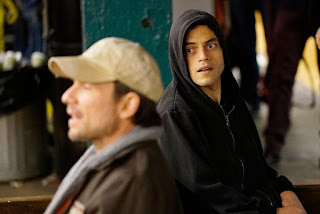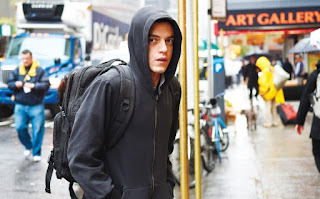When I was in high school, I dated a guy who was way way way too into Fight Club.
He thought it was amazing - which it is - but more than that he thought it was entirely serious. A devastating look at the need for people to rise up and destroy our capitalist shallow society. He was the same person who got me to watch The Crow and The Boondock Saints, and while I am really grateful for his influence on my media tastes, these days I kind of look back and wonder, "What the hell was I thinking?"
Because even back in high school, I was still the kind of overly idealistic, sunny, tie-dye wearing hipster I am now. I worked with Amnesty International and hung out with theater kids and tried to convince people to call me "Sunny." I liked Fight Club, thought it was pretty well made, but I didn't get it.
It wasn't until years later, in film school, that I realized that the reason I never "got" Fight Club is because I wasn't supposed to. It wasn't representing a real and achievable life philosophy, it was an exploration of toxic masculinity in the modern age. A look at what the emphasis on macho manliness and how men's power can clearly only be regained if they fight each other in underground bunkers and blow up buildings. It wasn't meant to be taken seriously, but rather to be a strong look at some seriously screwed up people. I felt a lot better once I found that out.
I mention all of this because watching the pilot episode of USA's new gritty hacker drama Mr. Robot gave me hardcore flashbacks to junior year. The same self-aggrandizing inner monologue. The same loner hero who is secretly so much smarter and cooler than everyone around him. The same paper-thin deconstruction of capitalism America that takes no intersectional forces into account and just blames everything on "big money".
The same plot.
I feel like, while I went to film school and realized Fight Club wasn't meant to be taken seriously, the creator of this show, Sam Esmail, might have missed the memo. A lot. Hard.
For all of that, it's not a bad show. It's a show where I'm pretty sure I've already guessed the end of season plot twist by episode three and where every character appears to react like a caricature of themselves, but not a bad one. It's very entertaining and quite frankly fun to watch. Once you get through the pilot episode, at least. That one is rough.
But if you power through you're rewarded with one of the more complex and engaging dissections of toxic masculinity you're apt to see on screen this year. It's just that I'm not sure this look at the ways that macho behavior is killing men is, you know, intentional.
So, to back up, Mr. Robot is a show about a very gifted computer hacker named Elliot (Rami Malek). Elliot is a special snowflake of a guy, narrating the entire show in vicious voiceover with long rants about consumerism and the stupidity of the "sheep" around him, but the show quickly makes it clear that Elliot isn't really all there. He is probably on the autistic spectrum, almost definitely schizophrenic, a drug addict, and a survivor of some level of child abuse. Elliot is a mess.
He's also, though, like I said above, a really talented hacker. He works for a cyber-security firm called Allsafe and he absolutely hates it. Presumably he hates it because he's helping to arm evil corporations against the crusading do-gooders (like him) who might hack into them and spill their corporate secrets. Elliot has a persecution complex a mile wide, and most of it is linked to EvilCorp*, the multinational conglomerate that has just hired Allsafe to secure their system.
This is a conflict of interest for Elliot. He blames EvilCorp for his father's death (possibly justly) and has sworn to destroy the company, but now he's being asked to protect it. Not only that, but he's just discovered that his best friend's job hangs in the balance. Said best friend, Angela (Portia Doubleday), is really the only person Elliot seems to care about at first. So he goes along for the ride and helps secure EvilCorp. But then they get hacked and Elliot discovers the layers and layers of hacking conspiracy around him!
See, EvilCorp gets hacked by a group called "FSociety" and their leader, Mr. Robot (Christian Slater) wants Elliot to join them. They need him. He has access to EvilCorp in a way they don't, and they need his help to pull off their biggest hack yet. So while FSociety leaks tons of EvilCorp files to the public, Elliot struggles with whether or not to let them frame the CTO of the company for their hack and carry on with their hacktivist ways.
I should point out here that Mr. Robot is at least a slightly more accurate show when it comes to the technical side of things than your usual television program about computers. I watched it with our very own computer expert Kyla Furey and she says that while it's not completely accurate and a lot of it is reliant on us being wowed by the big technology words the characters are saying, nothing so far has been actually wrong. Which is a nice change of pace for a show like this.
Anyway. The plot follows Elliot as he tries to decide whether or not to join FSociety and Mr. Robot in their crusade against EvilCorp, or if he's going to report them, turn them in, and manage to transform himself into a useful and happy member of society. And that really is the plot of the show, because three episodes in he just keeps going back and forth. One week he's about to pledge his life to the hacker gods, the next he's weirding out his boss by smiling and drinking Starbucks. One week he cyber-stalks his therapist's boyfriend and steals his dog, the next week he's asking his drug-dealer out on a date.
Okay, so generally speaking Elliot's personal life is kind of garbage. But he tries. Sometimes.
And all of this is complicated by the fact that we see the whole world through Elliot's eyes. As the audience, we are the person Elliot is talking to when he does his voiceover, and we are a sort of character. We're in his head. So when Elliot is thinking about something we see posters on the subway walls that are weirdly about that exact thing. When Elliot isn't sure if he's having a delusion or not, then neither are we.
This layer is what makes the show work. It elevates it from a preachy, well-intentioned but kind of dumb show, to an amazing examination of what it means to be a man in this digital age. Elliot is the very definition of an unreliable narrator, and that means that for once we get a character in whom we can see all of the effects of toxic masculinity at work. Being inside Elliot's head means that there's nowhere for him to hide from us. He has no secrets. And so we see exactly how he hurts himself with his understanding of what it means to be a man.
Not consciously, of course. The point I'm making here is that, intentional or not (probably not), Mr. Robot has managed to make a show that really complexly examines the ways that toxic masculinity affects all of us, whether we think we're above it or not. Elliot is a fascinating character because he so clearly believes he's above it all, but he's not.
Toxic masculinity has eaten away at pretty much all of Elliot's life. What I mean is that there's no part of his life where his belief that he has to be a "strong man" has not made his existence much worse, almost unbearable.
As Elliot himself points out, he's so lonely that sometimes he breaks down and sobs for hours, but he can't reach out for help because that just "not what he does." He's so convinced he has to be strong that he would rather turn to illegal drugs than actually talk to his court-mandated therapist. And instead of letting said therapist help him, he chose the therapist he could most easily manipulate and proceeded to take her on as someone he feels the need to protect.
Elliot's desire to protect people, while admirable, is taken way too far every time. He hacks his therapist and blackmails her boyfriends. He hacks his "best friend" Angela and keeps tabs on her cheating boyfriend. But he doesn't tell Angela her boyfriend is a cheater, no, he just makes sure that said boyfriend never hurts Angela's feelings. Yuck.
What makes it all so interesting isn't just how we can see the effects of Elliot's attempts to be a "strong man" wearing him down all the time, but also that he can see it too. He knows he's basically trying to wear normative humanity as a mask over his mental illnesses and "weirdness", but he has no idea how to do it.
Elliot's obsession with being strong and good and everything he thinks a man should be is made all the more tragic by the realization that he has no idea what real masculinity is. His mother was abusive. His father died when he was a small child. The closest thing he has to a male authority figure in his life is his boss, and Elliot thinks Gideon (Michel Gill)** is a well-meaning idiot.
Yes, all of this is tragic. But Elliot is a fictional character. And by showing how tragic all of this is in his life, we can only hope that the people watching this show will start to see the ways the toxic masculinity has affected them. Maybe it can help.
Because the biggest problem with toxic masculinity is how hard it is to tell from good masculinity. A lot of Elliot's impulses are really good motivations. He wants to help and protect people. He doesn't want to burden others with his feelings. He believes very strongly in justice. He has strong principles and he sticks to them.
The issue comes in Elliot's implementation of these impulses. He wants to help and protect people, so he cyberstalks all the women in his life and "solves" their problems without their consent or awareness. He wants to help them so he dehumanizes them in his mind and treats them like children. He doesn't want to burden people with his feelings, so he bottles everything up, even though there are many people in this story who want to help him and feel actually more burdened by his refusal to talk.
He believes very strongly in justice, so he helps with illegal hacks and considers blowing up a building. He has strong principles and he sticks to them, so he puts everyone he loves in danger and ruins people's lives like he's taking out the trash. I call this the "new masculinity" in the title because while it looks ostensibly different from the chest-beating, people-punching masculinity we're used to seeing, it's just the same ideas put in a different framework. Elliot's still trying to beat everyone up, he's just doing it with his brain, and that's not any better.
I actually think that Elliot might be one of the most complex and interesting male characters to appear on television in years, but I don't know if that's intentional. I'm really not sure if he's supposed to be the sort of "damaged genius who is secretly right all the time" or if the sheer lunacy of his life is meant to be part of the story. I can't tell if this is brilliant or terrible.
I suppose the lynchpin will be whether or not Mr. Robot turns out to be real or if he ends up being another Tyler Durden. Like I said in the beginning, the problem with this show is how much it clings to Fight Club as a mentor, and part of that comes up when we realize that Mr. Robot as a character is almost certainly not real. The other members of FSociety are, but Mr. Robot isn't. He's all in Elliot's head, which makes the issues of masculinity all the more intriguing. I mean, Elliot's ideal hallucination is a middle-aged man who tells him how proud he is of him? Dude, talk to your therapist about this stuff.
So if Mr. Robot does turn out to be a hallucination, then the show has done something interesting in its conversation about masculinity. It's given us a story where, essentially, Elliot has to imagine a whole alternate world in order to understand what it means to be a man. If Mr. Robot is real, though, then that means that the show is just badly written. Those are pretty much the only two options here.
But, either way, Mr. Robot is fascinating. Not good, maybe, but undeniably interesting. Elliot is the kind of character who aren't sure actually can be saved, but whose journey is interesting enough for it not to matter. He's a flipped image of Walter White, a vision of a man who desperately needs to just calm down and talk to someone, and I find that worth watching.
But man oh man does it remind me of high school.
 |
| And you cannot convince me that Darlene (Carly Chaikin) is not one big Marla Singer reference. |
**Gideon is hands down my favorite character. He is not an idiot and appears to be the only person on the entire freaking show who can tell that something is up with Elliot. Protect Gideon at all costs.








ESCORT
ReplyDeleteESCORTS
ESCORTS SERVICE
ESCORT SERVICE
ESCORT SERVICES
ESCORTS SERVICES
INTERNATIONALSEX GUIDE KOLKATA
CALL GIRLS NEAR ME
CALL GIRLFRIEND RELATIONSHIP
ESCORT SERVICES
KOLKATA SEX
CALL GIRL IN KOLKATA
ESCORT SERVICE IN KOLKATA
GIRLS WHATAPP NUMBER
ONLINE GIRLS
FEMALE ESCORTS
FEMALE ESCORT
CALL GIRL NAME AND MOBILR NUMBER
CALL GIRL KOLKATA
ESCORTS SERVICE
MASSAGE IN KOLKATA
GIRLS PHONE NUMBER
INDIAN MASSAGE PARLOUR SEX
ESCORTS SERVICES
CALL GIRLS NO
CALL GIRLS KOLKATA
BEAUTIFUL SEXY GIRLS
ESCORT KOLKATA
ESCORTS KOLKATA
ESCORT IN KOLKATA
ESCORTS IN KOLKATA
COLLEGE GIRL HOT
ESCORT SERVICE KOLKATA
KOLKATA VIP ESCORTS